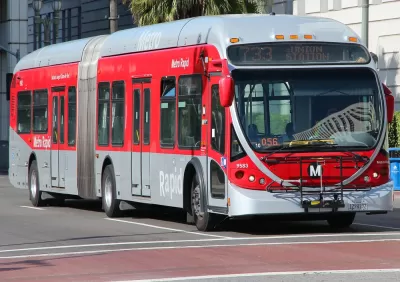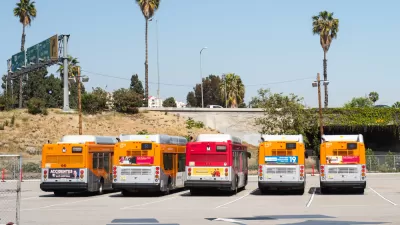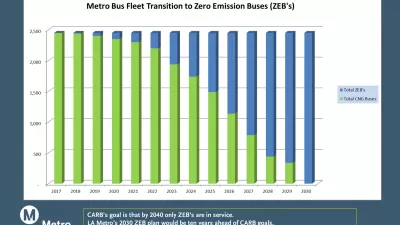The board of L.A. Metro voted Thursday to spend $138 million to purchase 95 electric buses plus chargers and wiring upgrades for two transit lines that now use natural gas buses, and approved a motion to convert all buses to battery-electrics by 2030

The Los Angeles County Metropolitan Transportation Authority (L.A. Metro) already has one of the cleanest bus fleets in the nations, with all 2,200 buses running on compressed natural gas (CNG) which emit less pollution than its diesel counterparts. Tailpipe emissions are expected to drop to zero by 2030 with the approval of a motion at the July 27 meeting, provided that the electric bus industry is able to manufacture buses that have greater ranges than the 95 buses they also agreed on Thursday to purchase.
At its meeting last month, the board agreed to purchase 295 buses that will be fueled with renewable natural gas. The board had been expected to purchase 35 electric buses at that meeting, but that was delayed to the July meeting.
The $138 million in contracts would be split between two manufacturers and used to convert two transit lines, report Laura J. Nelson and Emily Alpert Reyes for the Los Angeles Times. Note that the contracts also include chargers and wiring upgrades.
The board unanimously approved a $66-million budget to electrify the Silver Line, including buying 60 electric buses from BYD, installing chargers along the route, and updating wiring to handle higher wattages. The line should be finished by 2021, officials said.
Metro directors also voted to establish a budget of $72 million for replacing the Orange Line’s buses. That includes $51 million for 35 electric buses from New Flyer, and $7.8 million for charging stations at both ends of the line. The route should be fully electric by 2020, officials said.
In addition to the electric bus contracts, the board agreed to two contracts to upgrade and replace the existing compressed natural gas bus fleet, reports Steve Hymon for The Source.
- A contract was approved to purchase 65 60-foot CNG buses from New Flyer to replace buses purchased between 2004 and 2008 and go into service between 2018 and 2022. Staff report.
- A contract was approved worth up to $26.5 million with Cummins Engines for up to 395 ‘near zero emission’ CNG engines for existing buses. Staff report. [Also see June post on the meeting.].
"Though the technology has evolved in recent years, battery-powered buses still can’t travel as far as their natural gas-powered counterparts, which can run 400 miles on a tank," add Nelson and Reyes. "In a recent report, Metro employees said that electric buses as they exist today pose 'significant risks to service and operation.'"
However, the motion [jpg] the board approved Thursday was more optimistic on the technology and the role played by the agency:
Metro plans to spend nearly $1 billion on bus procurements in the next 10 years. That level of investment, coupled with a transition to all electric buses, presents an opportunity for LA County to demonstrate leadership on combatting climate change and can make Los Angeles the central marketplace for new electric bus technology...
Hat tip to Evan Gillespie.
FULL STORY: Metro agrees to buy 95 electric buses, in the first step toward an emissions-free fleet

Alabama: Trump Terminates Settlements for Black Communities Harmed By Raw Sewage
Trump deemed the landmark civil rights agreement “illegal DEI and environmental justice policy.”

Planetizen Federal Action Tracker
A weekly monitor of how Trump’s orders and actions are impacting planners and planning in America.

Why Should We Subsidize Public Transportation?
Many public transit agencies face financial stress due to rising costs, declining fare revenue, and declining subsidies. Transit advocates must provide a strong business case for increasing public transit funding.

Understanding Road Diets
An explainer from Momentum highlights the advantages of reducing vehicle lanes in favor of more bike, transit, and pedestrian infrastructure.

New California Law Regulates Warehouse Pollution
A new law tightens building and emissions regulations for large distribution warehouses to mitigate air pollution and traffic in surrounding communities.

Phoenix Announces Opening Date for Light Rail Extension
The South Central extension will connect South Phoenix to downtown and other major hubs starting on June 7.
Urban Design for Planners 1: Software Tools
This six-course series explores essential urban design concepts using open source software and equips planners with the tools they need to participate fully in the urban design process.
Planning for Universal Design
Learn the tools for implementing Universal Design in planning regulations.
Caltrans
Smith Gee Studio
Institute for Housing and Urban Development Studies (IHS)
City of Grandview
Harvard GSD Executive Education
Toledo-Lucas County Plan Commissions
Salt Lake City
NYU Wagner Graduate School of Public Service




























